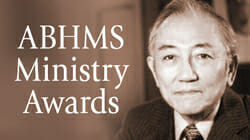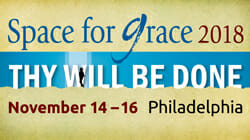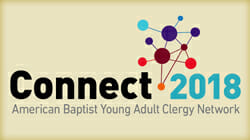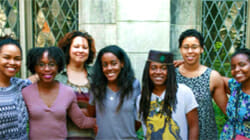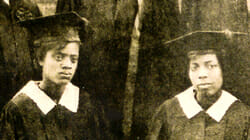ABHMS honors Black History Month
To mark Black History Month 2018, American Baptist Home Mission Societies is proud to feature one prominent African American per week throughout February.
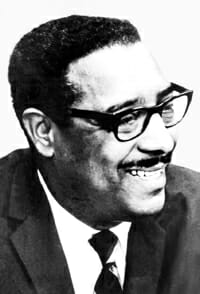 Week 4: Samuel DeWitt Proctor
Week 4: Samuel DeWitt Proctor
Samuel DeWitt Proctor (1921-1997) was a celebrated preacher, teacher and mentor. In 1985, Ebony magazine named him one of the top 15 black preachers in America. He received more than 40 honorary doctorates, and Time magazine named him one of the most popular college and university speakers in the United States.
In 1950, Proctor became a friend and mentor to Martin Luther King Jr., who was a student at what was then Crozer Theological Seminary, Upland, Pa. During the 1955 and 1956 bus boycotts, Proctor was a frequent guest in both King’s home and church.
Among his positions with various churches and institutions of higher learning over the years, Proctor was named president of North Carolina Agricultural and Technical State University in 1960. There Proctor found himself involved in the sit-in movement among Southern African-American college students as well as acquainted with then-student body present Jesse Jackson. Proctor also served as president of Virginia Union University, which named its theology school in his honor upon his death in 1997.
Proctor held several governmental positions in the administrations of presidents John F. Kennedy and Lyndon B. Johnson, including director of the Office of Economic Opportunity and as a speechwriter.
Sources: “An Encyclopedia of African American Christian Heritage” by Marvin A. McMickle, Judson Press, 2002, and judsonpress.com.
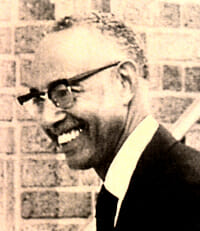 Week 3: Thomas Kilgore Jr.
Week 3: Thomas Kilgore Jr.
A pastor and civil rights activist, Thomas Kilgore Jr. (1913-1998) was a major African-American leader of the 20th century.
He was first black president of American Baptist Churches USA, 1969-1970, and served as president of the Progressive National Baptist Convention, 1976-1978.
A graduate of Morehouse College, Atlanta, he served as chairman of the school’s board of trustees, 1974-1991, and presided at the ribbon-cutting ceremony for the campus center named for him in 1992. He served as executive secretary of the General Baptist State Convention of North Carolina, beginning in 1945.
In addition to serving at other churches over the years, he accepted the challenge of three simultaneous roles, 1938-1947: pastor at both Friendship Baptist Church, Winston-Salem, N.C., and Rising Star Baptist Church, Walnut Cove, N.C., as well as chaplain at Winston-Salem University.
While serving at Friendship Baptist Church, New York City, Kilgore and Bayard Rustin helped to plan “A Prayer Pilgrimage for Jobs and Freedom,” the 1957 march on Washington. In addition, both helped to organize the 1963 March on Washington, at which the Rev. Martin Luther King Jr. delivered the famous “I Have a Dream” speech. In his role as director of operations for the Southern Christian Leadership Conference, Kilgore was a close advisor to King and was among those who guided the mule cart that carried the body during King’s funeral.
Sources: “An Encyclopedia of African American Christian Heritage” by Marvin A. McMickle, Judson Press, 2002, and judsonpress.com.
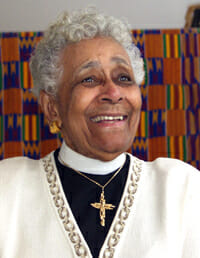 Week 2: Ella Pearson Mitchell
Week 2: Ella Pearson Mitchell
Known as the “dean of black women preachers in America,” Ella Pearson Mitchell (1917-2008) advocated tirelessly for women who showed a gift for preaching. Ebony magazine named her one of the top 15 black women preachers in America in 1997.
She began her teaching career at what is now known as American Baptist Seminary of the West, Berkeley, Calif.; was an associate professor of Christian Education and director of Continuing Education at Interdenominational Theological Center, Atlanta; and was first woman dean of Sisters Chapel at Spelman College, Atlanta.
She and her husband, Dr. Henry H. Mitchell, were instrumental in re-establishing “team preaching.” Together they founded the Ecumenical Center for Black Church Studies in Los Angeles and served as co-mentors in the Doctor of Ministry program at United Theological Seminary, Dayton, Ohio.
For Judson Press, Mitchell edited “Women: To Preach or Not to Preach: 21 Outstanding Black Preachers Say Yes!” and the five-volume “Those Preaching Women” series. She and her husband penned their autobiography, “Together for Good: Lessons from Fifty-five Years of Marriage” (Judson Press, 2005).
Sources: “An Encyclopedia of African American Christian Heritage” by Marvin A. McMickle, Judson Press, 2002, and judsonpress.com.
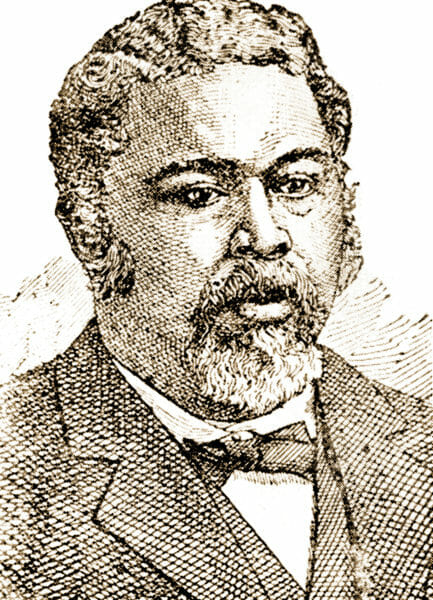 Week 1: George Liele
Week 1: George Liele
George Liele (1750-1820) may have been the first black preacher of an organized congregation in America. Eventually freed, he was still a slave in 1773, when he began preaching on a plantation in Silver Bluff, S.C., at the first black Baptist church organized in the United States.
Liele was converted and baptized while attending church with his master. Soon after, Liele’s gift for preaching was discovered, and he was allowed to travel freely—as far as the Yamacraw region along the Savannah River—to preach on plantations to thousands of slaves. In fact, Liele baptized the family of Andrew Bryan, who went on to establish the African Baptist Church of Savannah, Ga.
During the Revolutionary War, when Savannah fell to American forces, Liele accompanied the British when they fled to Jamaica. There he organized a church in Kingston that grew to more than 500 congregants. In addition, he founded and supervised a school for community children. Because of his efforts in Jamaica, Liele is considered the first American-born missionary to another country.


